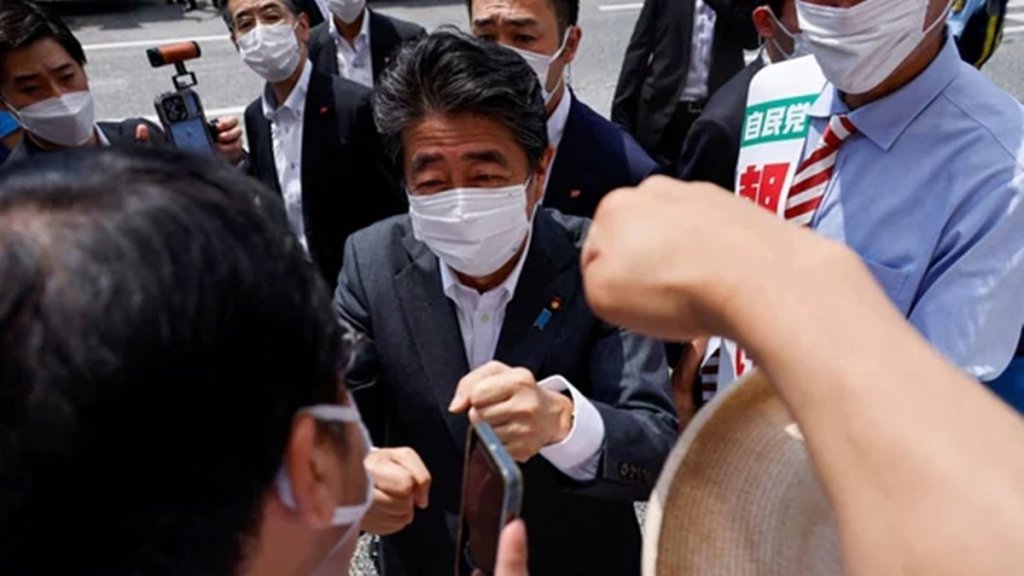By Jay Maniyar
The Japanese Prime Minister Shinzo Abe sadly passed away on the 8th of July, 2022, after having been assaulted by a 41-year-old former Japan Maritime Self-Defense Force (JMSDF) officer. Abe, who had resigned from the Prime Minister’s post in December 2020 becauseof ill health, was immediately rushed to hospital and declared dead later. Abe had also briefly served as Prime Minister in 2006-07 and this was the time when the term ‘Indo-Pacific’ had re-emerged and gained worldwide notice and traction. For Japan, as it has entered the era of peace and harmony, the sickening assassination of Abe is very worrying and is likely to trigger debates over domestic security and crises such as the one that has just unfolded.
Among the Liberal Democratic Party (LDP) stalwart’s especially notable achievements was the revival of the Indo-Pacific that was ushered in by him single-handedly over the past two decades. This was during the peak of his Prime Ministership. Abe gave a momentous speech in the Indian Parliament in 2007 which brought in glittering Indo-Pacific illuminations such as the ‘confluence of the two seas’ to bring about inter-continental cooperation and maritime security. He even spoke of the ‘democratic security diamond’, an early reference to a partnership between liberal democracies against communist China.
Shinzo Abe pioneered ‘Indo-Pacificism’, a concept which unites the Indian and Pacific Oceans for prosperous economic, environmental, security, energy, and high-tech relationships between the many countries and mini/multi-laterals in the area. Today, solely because of Abe, the Indo-Pacific is hinged on immense and impeccable infrastructure-connectivity corridors and improved bilateral/multilateral trade and economic security relations in the region.This is despite the overarching threat posed by an indefatigable Chinese hegemon. China is a ‘frenemy’ of Japan that tends to lean more towards being an enemy because of historical as well as contemporary factors such as the wartime period and present-day maritime-naval clashes in the East China Sea.
Abe critically served as an inspiration for all those who were reluctant to engage in Indo-Pacific affairs and provided crucial leadership in the absence of even democracies such as India and the United States of America (USA). Geostrategic Indo-Pacific concerns are reasoned by China’s territorial (maritime, in particular) assertiveness, and these have been considerably eased by a Tokyo that is willing to go head-to-head with Beijing on all fronts. Abe’s Indo-Pacific initiations have only bolstered Japan’s Indo-Pacific visions and strategy. Japan set up a base in Djibouti six years earlier than China. The latter lacks maritime-naval bases anywhere in the world, apart from Djibouti.
Indeed, the Indo-Pacific vision founded on the noble virtues of freedom, openness, oneness, transparency, order, cooperation, coopetition, and the rule of law are all attributable to Abe and his Japan. The virtuoso Prime Minister has left behind a heritage and a tradition that will only be taken ahead if his successors were to continue to identify with him for the long-term, as he will always be someone who is still alive through his ideas, speeches, and visions.
The revival of the Indo-Pacific is a gift by Abe to India because the region signifies India’s importance in the Indian Ocean region and, going ahead, in the western Pacific, too. The Indo-Pacific entwines India with a vast geography of the planet and hence supports a strategy for the country to engage with its partner-countries and others.
This is being accomplished in a number of new areas such as clean energy, modern transport, the trade of defence equipment from India to defence-seeking countries – which heralds a marked shift from the past decades and transforms India’s image on the world’s stage, and the holistic security of the maritime domain from the prevailing traditional and non-traditional threats such as climate change and sea piracy.
Abe is gone but his Indo-Pacific influence, importance, and inheritance persist. All of these will belong to Tokyo, since it is the fulcrum of the Indo-Pacific region as a whole. Tokyo will be expected to run the Indo-Pacific race from a lofty perch, as Asia’s most developed country, but complacency could derail this optimism. Japan also has much to do in delinking with the United States, its sole treaty-ally, to emerge as a power in its own right in the Indian Ocean.
New Delhi, as Japan’s special strategic and global partner, has much to gain from identifying with Abe for the times to come. Together, the countries of the Quadrilateral Security Dialogue (featuring the four democracies of India, Japan, the United States, and Australia), in particular, will have to collect the baton from Abe. India, Japan, and the QUAD will have to nurture the Indo-Pacific like it is their own or a belligerent and outward-looking China will surely make the region its own.
(Author is a researcher writing two books for the National Maritime Foundation (NMF) on Japan and South Korea’s geopolitical, geo-economic, and geostrategic interests in the Indian Ocean. He is also a Research Fellow at the Defence Research and Studies DRaS) think-tank. Views expressed are personal and do not reflect the official position or policy of Financial Express Online. Reproducing this content without permission is prohibited).


